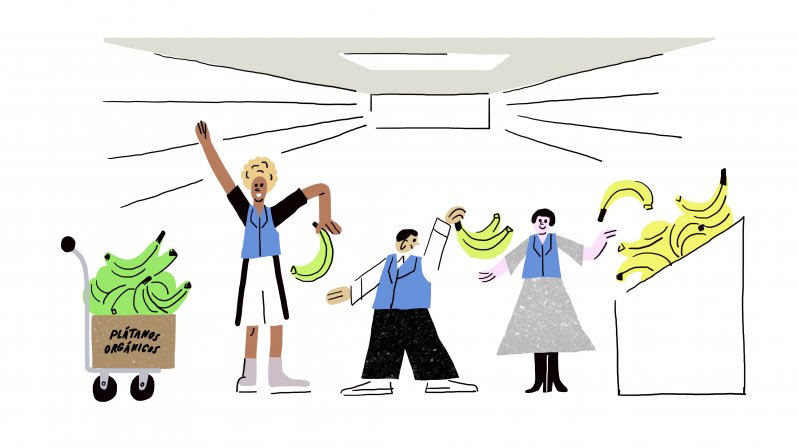For agency workers, everyday life is full of uncertainty
Agency workers doing gig work don’t have the support of a work community, and there’s also no guarantee the work will continue. Under the law agency workers must be treated equally with other workers, however.
When you go from one workplace to another on short gigs, you’re always stressed about what the next work location will be like. Will the people there remember the gig worker’s first name?
An agency worker’s assignment at a particular workplace can also last longer. Then it’s easier for an agency worker to become a member of the work community, but they may be unsure whether their work will continue in the next roster.
These are the experiences reported by an agency worker who was interviewed for this article and appears under the name Aino.
In agency work, employees have two employers: the agency that pays their wages, and the host company, possibly a shop or restaurant, under whose management the work is performed.
What it’s like for Aino, 20: “Back-up needed on checkout four”
“I have been round about 15 shops and restaurants in Uusimaa as an agency worker. The worst thing about these gigs is that I never know beforehand what I’m getting myself into. Workplaces are so different!
In some shops the training shifts have been unpaid. I have worked six hours without being paid at all. At another retail operator the training shifts were paid later on after the work continued. Unpaid training seems wrong – is that allowed? I get the feeling you need to be really careful about your rights.
Many workplaces assume that agency workers can do everything just as well as workers who have been there a long time. Permanent employees can raise their voice and snap at you when you ask them to help. Then there is the other extreme, which also gets you down. Coaches. That’s what my friends and I call people at the workplace who think there is only one right way to do the work.
Agency workers really are shut out of the work community. Sometimes it feels weird going into the break room at work. When I say hello I only get one reply even though there are six people sitting there.
But there’s one thing I have noticed that helps me to feel welcome in a workplace. That’s when there’s a good team spirit among the permanent employees. These are the workplaces where they remember my first name. It’s much nicer when they remember your first name and use it. But it’s quite common to hear “back-up needed on checkout four”.
I do the odd shift on a zero-hours contract. The shifts show up on my phone and they can go in a matter of minutes. Often the workplace is vague about future work, saying “we’ll take another look next week”. Obviously you don’t get a steady income this way. There’s no guarantee agency work will continue. Often I suppose the work ends because they don’t need the labour any more. In spring I want to look for a regular job, but I don’t think I’ll find it at the agency workplaces. ”
Aino, 20

Support of the work community is important
Helmi Soininvaara has studied agency work as a student trainee at PAM. She recognises what Aino is going through and says that agency workers often have problems around belonging to the work community.
“Belonging to the work community is important because it supports wellbeing at work and makes the work meaningful.”
Soininvaara has done agency work herself and also understands the other side to this:
“There’s high turnover in agency workers. For the permanent employees at a workplace, it can be frustrating to be continually coming across new workers and having to teach them the job. In that sense using agency workers also undermines the permanent employees’ work community.”
In her report, Soininvaara describes how the interests of permanent staff and agency workers at a workplace can overlap, which can increase tensions. To an extent they are competing for the same additional hours. Agency workers are also in the thankless position of being ”back-up labour”. It’s also true that during the current epidemic many agency workers have noticed that their hours were cut first.
In her report, Soininvaara highlights that although everyone is equal in the eyes of the law, there are differences in employment benefits. In agency work, a break between assignments can mean that benefits like occupational healthcare, annual holidays, pay during sick leave and seniority supplements are cut off and the worker then has to start all over again.
Uncertainty about rights
PAM’s recent members’ survey reveals that agency workers have a somewhat more distant relationship with the work community than other workers. 76 per cent of them felt they were part of the work community, whereas for other workers the figure is 83 per cent. 7344 individuals responded to the survey, including over 300 agency workers.
Presumably it would help agency workers to feel part of the work community if they felt they were equal to permanent staff when it comes to terms and conditions of employment. SAK’s agency work guide stresses that under the law agency workers must be treated equally as compared to other workers. The agency work guide produced by the Ministry of Economic Affairs and
Employment also contains a long list of rights of agency workers.
But Aino, who was interviewed by phone, is uncertain as to her rights.
"Can you really have unpaid training sessions in agency work? " Aino asks.
This is the answer of PAM’s collective bargaining specialist Marianne Friman:
“You can’t have staff do unpaid working hours”, Friman says firmly.
And do agencies have to offer workers on zero-hours contracts new work if they have a long-term assignment that ends?
Friman admits that there are a number of problems with zero-hours contracts from the employee’s perspective. If agency workers themselves want continuity in their work, they should agree a certain number of hours with their employer.
“It’s definitely better if average minimum working hours are agreed in your employment contract”, Friman says.
She reminds agency workers of the collective agreements that apply to their work:
“It’s important to remember that in the commercial sector and the hotel and restaurant sector, for example, zero-hours contracts as such aren’t possible because their collective agreements stipulate that average minimum working hours must be agreed.”
In practice problem areas have included termination of employment if, instead of giving notice, an employer has just stopped offering an agency worker working hours. The worker might be left wondering whether the work will continue or not.
What should agency workers take into account?
PAM’s collective bargaining specialist Marianne Friman gives some tips.
- Make a written employment contract with the agency. If any points in the contract are unclear to you, ask your employer what they mean.
- If your employment is fixed-term, check the length of the fixed-term contract and the reason for it being of limited duration. In agency work, fixed-term contracts are possible under the same conditions as in other employment relationships. It is always worth finding out the reason why the employment is fixed-term.
- Agency workers are also entitled to orientation training for their work and for occupational safety. Wages must be paid for orientation shifts!
- More information here.



